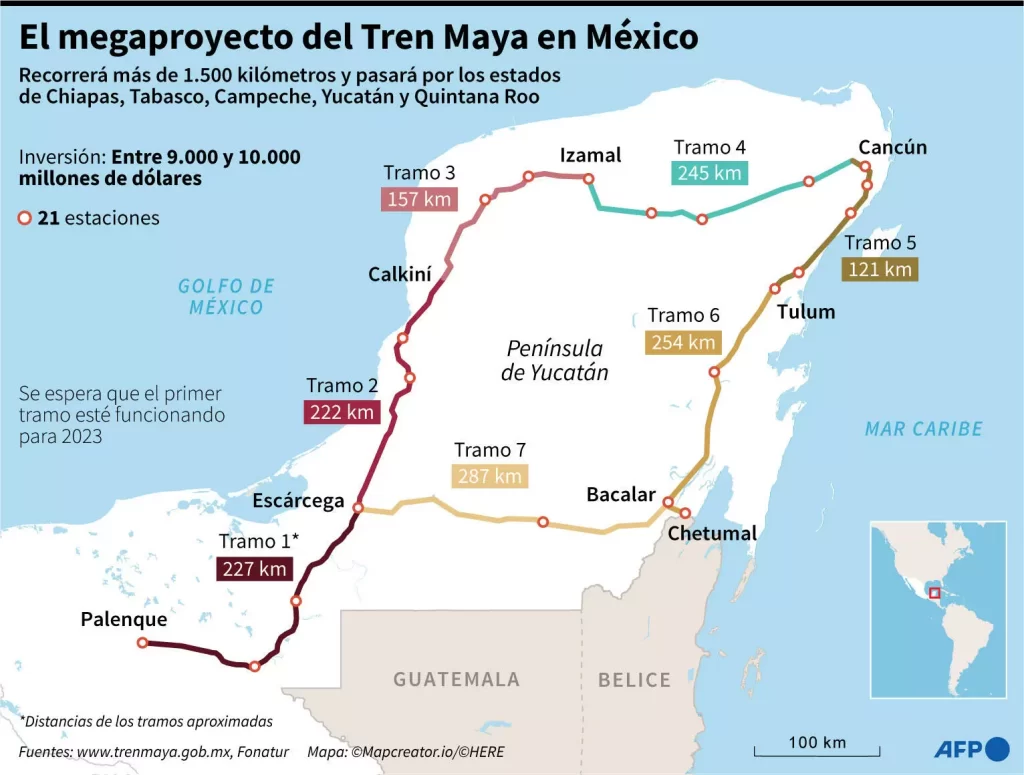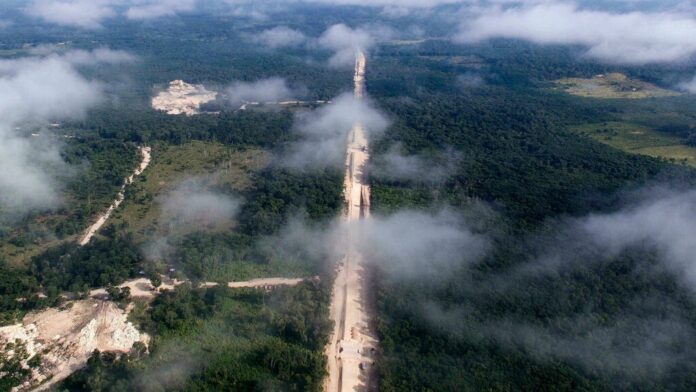Residents in one of Mexico’s poorest regions, known for indigenous uprisings, are divided over a proposed Mayan tourist train in the Yucatan peninsula.
Guadalupe Caceres, 64, was overjoyed when she learned that the original route was being changed and would no longer pass through her neighborhood. “We have lost, farewell modernity,” said Ruben Angulo, 49, a locksmith who was expected to be rehoused but is still waiting for one of the half-million jobs promised by the government.
President Andres Manuel Lopez Obrador’s hallmark plan in 2019 was to build a 1,500-kilometer ring around the Yucatan peninsula to service the major tourist center that includes beach resorts Cancun and Tulum, as well as the Mayan ancient monuments of Chitzen Itza and Palenque.
- China’s Inner Mongolia quarantines tourists over virus fears.
- Russia marks another daily death record as infections soar.
“Yes, (modernity) will be present, but not at the price of my home,” Caceres stated.
She took her objection to the courts and the train will no longer pass through the center of Campeche, a fortified colonial town where one of the 15 Mayan Train stations will be located, but will now remain on the outskirts
Lopez Obrador described the $10 billion train project—one of the biggest in Latin America—as “an act of justice” for the states of Chiapas, Tabasco, Campeche, Yucatan, and Quintana Roo.
Poverty in the region of 13 million people is over 50 percent, and reaches 75 percent in Chiapas. Public transport in the region is poor and some of the best sites to visit are far from the main cities. – ‘National security”
Many in the region reject the left-wing nationalist president’s claims that the train will improve their lives. The project’s detractors include environmentalists, indigenous people, government opponents, and even the EZLN former guerrilla movement. The project faces 25 legal challenges accusing it of violating environmental and housing rights.

“We twisted the government’s arm,” said Caceres triumphantly. Mexico’s center for environmental rights, which launched one of the legal challenges, highlighted the cutting down of trees in protected areas and the fragmentation of ecosystems that could turn them into “biologically degraded and inhospitable” places.
The challenge also pointed to the potential effects on water bodies, animal species in danger of extinction and mangroves. Some 200 kilometers from Campeche, there is another train station in Candelaria, close to the border with Guatemala. In a poor area without running water, 500 farmers have held a contractor’s excavator hostage since September, demanding compensation for the project that cut their village in two.
Until this problem is resolved, we won’t let the work begin, “said Erendira Ocana, 30,” from under a huge mahogany tree. A 227-kilometer long section, the first of seven, is due to pass through this point and is supposed to be operational in 2023. Although the train does not pass through San Cristobal de las Casas, the Chiapas fiefdom of the Zapatista Army of National Liberation (EZLN), the former guerrillas have been active in opposing the project in the courts.
Faced with these challenges, Lopez Obrador declared his mega-projects a “national security” issue in November so that his opponents “could not prevent them.”
The army has been enlisted to build tracks while Franco-Canadian firm Alston-Bombardier has been contracted to make 42 trains.
Potential disaster
According to Fonatur, the body tasked with delivering the project, it has the support of the majority of local residents. In an attempt to appease environmentalists, Fonatur said it would extend Mexico’s largest tropical forest reserve, Calakmul, by 730,000 hectares, to 1.2 million hectares.
Authorities have also announced plans to protect Mexico’s heritage in the face of a wave of tourists. Thousands of remains have been found during excavations. Cancun and Tulum already attract 12 million tourists a year, although the tourist industry is controlled by major hotel chains. With an estimated 31 million visits in 2021, tourism will account for almost eight percent of Mexico’s GDP.
The train will “reconfigure the Yucatan peninsular and its repercussions will be long-term… it could go quite well or be disastrous,” warned Etienne von Bertrab, a professor of political ecology at University College London. She is due to be moved to one of the new houses the government is providing for hundreds of families. Perez also sold food to the construction workers building the new homes.
I wanted to set up a business selling food. I never gave up, “she said from what will be her new kitchen.


